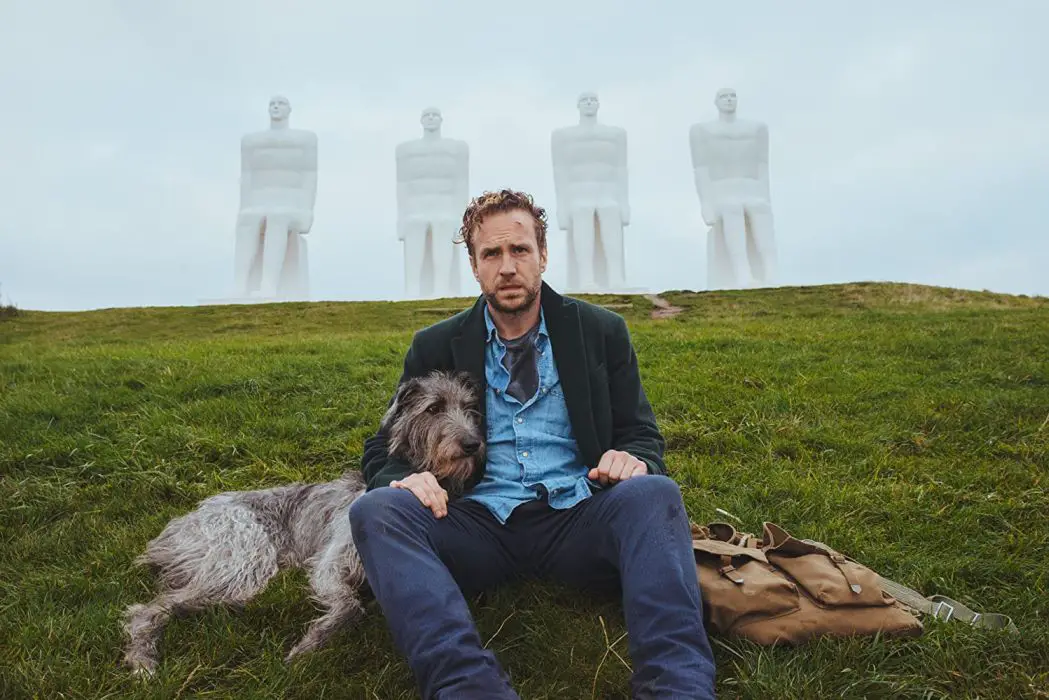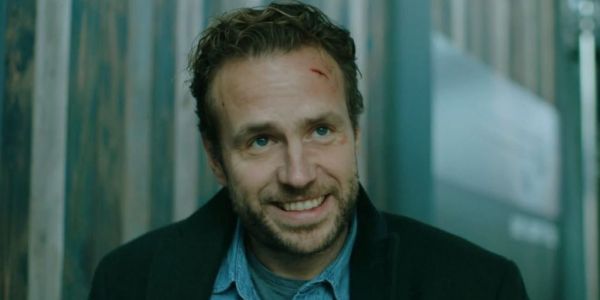Glasgow Film Festival 2020: DENMARK

Former film student from Scotland turned writer and film reviewer.
Meet Herb (Rafe Spall). His life in a quiet little Welsh town on a hill is far from perfect. He’s just lost his welfare, his son doesn’t speak to him, he can’t find a job, and his upstairs neighbour has a habit of playing the most ear-thumpingly bad rave music virtually 24/7.
Things can’t get much worse for Herb, so when he sees a documentary about how great the Danish prison system is, he hatches a plan to go to Denmark, rob a bank, get caught, and live his life in the comparative luxury of a Danish prison cell. It sounds easy enough, but when Herb arrives in Denmark and meets the charming single mother Mathilde (Simone Lykke), will he be able to see it through?
The Happiest Place on Earth
There has been much talk in recent years of Denmark’s status as the Happiest Place on Earth. There have been books written, documentaries filmed and talks given about the Danish way of life and how other countries can ascribe to it. This feels particularly relevant in today’s age of austerity, especially as it is in Britain, and how we survive this.
The day-to-day life Herb lives is indicative of the lives of so many in the UK. He is jobless, isolated, and virtually living in squalor. Alongside his equally hopeless friends – who spend their days smoking weed and doing not much else – Herb’s life gives the audience an insight into the aimless, drifting mess of a generation who don’t feel they fit into the modern world. This hopelessness is tangible and Shergold does well to capture the insulated nature of the tiny Welsh town; you can almost feel the desolation pouring from Herb throughout this film as he walks through barren streets and empty housing estates.
For his part, Rafe Spall does an excellent job of communicating this. Herb is a man at the end of his rope, coupled with a thousand-yard stare a sense of pointlessness; yet Spall infuses this lovable loser with just another charm to make you cheer him on.

Shergold, though, is not quite Ken Loach, and Denmark certainly never tries to be I, Daniel Blake, although you could argue the comparisons at some junctures. Instead, when Denmark starts to feel it’s sliding into despair, the tone shifts into light comedy. Herb’s plan is never fully fleshed out – as pointed out to him by his friends – and there’s something almost fairytale-ish about the whole affair once Herb actually puts his plan into action.
Rather than Denmark being about the state of British social policy, and an examination of the future of Gen Y-ers, it pivots and narrows its scope – focusing purely on the journey of Herb to Denmark and his fateful meeting with Mathilde. There is even a mid-point sequence involving Herb’s attempts to rob a bank, and a recurring motif involving Danish public bathrooms. At this point you can’t help but feel Denmark, much like its protagonist, has lost its direction.
A Lucky Break
The inclusion of Mathilde is another curious point here. The meet-cute between her and Herb, and their subsequent meetings thereafter, feels – again – like a fairytale, and jars with the earlier tone the movie set. For all that Herb simply travelled to a different country, you feel he somehow landed in a different world entirely. This is not to say that the dynamics between Herb and Mathilde don’t work, or that Simone Lykke isn’t good as the vulnerable counterpoint and foil for Herb, it’s just that that wasn’t the movie Denmark hinted at being in its opening moments. Instead, the movie seems more focused on Herb and Mathilde as they navigate each other.

It’s also strange how much luck Herb seems to encounter on his travels to Denmark. For a hopelessly inept man he is surprisingly resourceful. This stretches the bounds of credibility sometimes – such as when, in order to get across to Denmark without having to pay for transport, Herb arranges to be smuggled into a shipping container. When he does arrives in Denmark (free of charge, conveniently for a poor man), he manages to walk into the bar where Mathilde works and she – for reasons unexplained – takes a liking to him. It’s understandable that there needed to be narrative inventions in order to get the penniless Herb across to Denmark, but at times it can feel a little insulting to the audience’s intelligence. You feel at times as though you can see the machinations of the plot whirring away as the movie progresses.
For all this once Herb arrives in Denmark and the film settles into the new tone it sets, Denmark becomes a quaint, light reflection on mental health and the need for friendship. Herb, throughout, is clearly battling with demons and seems constantly on the edge of a nervous breakdown. He responds with confusion at Mathilde’s gestures of friendship, and seems nonplussed at the dog which has taken to following him around town. There is something to be said, in these small moments, about the power of community and this is where the contrast between the social policies of Denmark and Britain could be explored, but the film is content to stay with Herb as his encounters with Mathilde and her daughter remind him of the connection he yearns for with his own son.
Ultimately, at its core, Denmark seems primarily concerned with Herb’s relationship to his son. Just as the opening saw him live in isolation, succumbing to the pressures of modern life, the portion in Denmark seems to be aiming at the idea of connection with others, and this is channelled through Herb’s reflections on his relationship with his son. Even the denouement focuses mostly on how Herb can apply what he has learned from his Danish experiences to his relationships back home in Wales.
Denmark: Conclusion
Denmark is a difficult film to pin down. Initially suggesting it might focus on social deprivation and the effects of austerity in modern Britain, it pivots quickly – through a hard-to-believe set-piece – into a light-hearted romcom-ish fairy tale about the need for connection and community. Rafe Spall does excellent work here as the downbeat Herb, and though it’s arguable that no-one else really has any heavy-lifting to do (even Lykke is given very little to do, although what she is given she makes use of very well), the supporting cast are solid and dependable here.
The ending feels sharp and abrupt, to this viewer at least, and you may be surprised when it comes. Denmark isn’t really interested in trying to answer any questions it raises, instead it is content to muse on the journey of one man who just wants a better life for himself.
Where do you think is the happiest place on Earth, and why? Let us know in the comments below!
For all release dates for Denmark, please see here.
https://www.youtube.com/watch?v=WPYoMDwaw4s
Does content like this matter to you?
Become a Member and support film journalism. Unlock access to all of Film Inquiry`s great articles. Join a community of like-minded readers who are passionate about cinema - get access to our private members Network, give back to independent filmmakers, and more.













